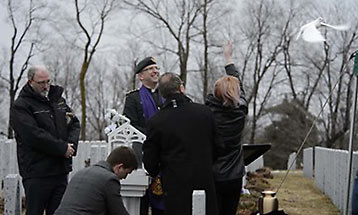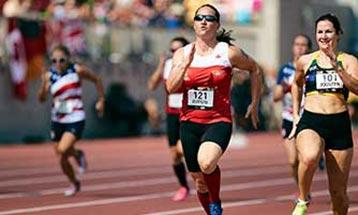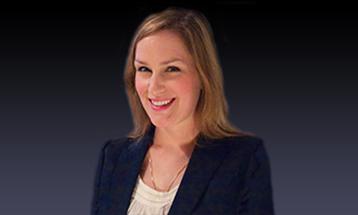Michel’s faith has always been important in his life. On the drive to work after release one day, he reflected on his career. He said, “Thanks, God. What’s next?” The answer: “Military chaplain.”
How did he get to this crossroads?
Michel Gagné was born into a military family. His paternal grandfather had served in the Van Doos, the Royal 22nd Regiment, during the Second World War, and his father had been a navigator in the Royal Canadian Air Force during the Cold War. It was almost natural that Michel would want to serve as well.

Padre Gagné flying with his unit, 450 Tactical Helicopter Squadron in CFB Petawawa 'By air to battle.'
“My father used to tell us stories about flying over the Atlantic, tracking foreign submarines and photographing freighters that were polluting the ocean,” he recalls.
Michel studied fuels and materials engineering at the Royal Military College (RMC), a member of the first class to include women. After graduating in 1985, he was posted to CFB Petawawa, where he commanded a Cougar armoured troop and led the biathlon team.
While in Petawawa, 17 January 1986 was a special day for Michel. That was the day he met the woman who would become his bride. “I knew she was the one as soon as she walked into the room.” They were married that year, and the following summer were posted to CFB Lahr in West Germany, moving shortly afterwards to Shrivenham, England. Michel earned a postgraduate degree in military vehicles technology at the Royal Military College of Science.
Promoted to Captain, Michel was then posted to CFB Gagetown as the armoured trials and evaluations officer. There he conducted user trials and evaluations of systems such as the mine effects simulator and SIG Sauer P225 pistol.
Michel and his wife then returned to CFB Lahr, this time with a newborn son. Michel joined the 8th Canadian Hussars, eventually as battle captain to the reconnaissance squadron. When the base closed in 1993, the Gagné family moved to Ottawa, where Michel served at National Defence Headquarters, writing requirements for the Weapon Effects Simulation program.
Michel’s passion for learning is obvious.
“I always wanted to study gunnery and become a gunnery instructor,” he says. He returned to RMC, taking his growing family which now included a newborn daughter. Michel earned a post-graduate degree in gun systems design.

Padre Gagné and Chinook pilot Captain Jackie Jeffrey during combined arms training at CMTC Wainwright.
The class project was to design a lightweight, long-range 155 mm towed howitzer. This was the kind of weapon the CAF would buy: the M777 for operational deployments, four of which Canada recently donated to Ukraine.
In January 1996, Michel joined the 12th Regiment Blindé du Canada (formerly the 12th Canadian Armoured Regiment).
In 1998, he returned to the Directorate of Land Requirements (DLR) at National Defence Headquarters in Ottawa. Three years on, he reflected on his career. “When you’re not having fun anymore, it’s time to get out,” he says. Michel Gagné officially retired (for the first time) on 11 September 2001. “It almost did not happen that morning,” he remembers, “for obvious reasons.”
After release, Michel worked for five years at a defense software company. Still feeling the call to serve, he joined the Régiment de Hull, becoming commanding officer after three years. Now a Lieutenant Colonel, he left the software company and returned to the DLR. He defined the requirements for the tactical armoured patrol vehicle project (TAPV). “It is the best protected vehicle of its type in the world, bar none,” he says. The CAF now has five hundred TAPVs in service.
Faith and service
Michel’s faith has always been important in his life. Even so, hearing the answer to his “what’s next” question was a turning point in his life.
When the answer, “Military Chaplain” came, “I actually pulled over,” he recalls. “I said, ‘God, I am not laughing, I am not questioning this. Tomorrow, I am going to ask the question again to see if I am just imagining this.’” The next day he got the same answer, “Military chaplain, Anglican. Get on with it.”

Padre Gagné with CWO (Retd) George Hodgkinson during his church placement at Holy Trinity, Pembroke. George was a great influence during Michel's military career and became a lifelong friend. He passed away in July 2023.
He spoke to his priest, his bishop, and the CAF regular force recruiting centre to learn what following his calling would take. He would have to relinquish his rank, moving from LCol. to Captain. After three years of further education, he served a two-year church placement in Pembroke.
After ordination as an Anglican minister, Michel was posted to CFB Petawawa and served two years at Holy Trinity church in Pembroke, coming home to Kanata for a couple of nights most weeks. After this on-the-job-training, he was posted to the Chaplain team at CFB Petawawa and served for another three years as Chaplain.
Long-distance commuting each week for five years was tough, but did have an upside. “I spent a lot of time with the troops, working out with them at the gym, visiting them in the helicopter hangar lines, and at least once a week, flying.
“One night, I spotted a moose swimming across a moon-lit lake at midnight.”
In 2019, Michel served as Task Force Chaplain on the RCAF deployment to the UN mission in Mali, West Africa.
As Chaplain, he offers spiritual, religious and pastoral care to CAF members and families in Petawawa as well as a wider community in the Ottawa area. In all, he’s there for a community of some 16,000.
Michel describes his job as providing a “ministry of presence”—called to serve when and where the members and their leaders need support.
Tips for CAF members approaching release
Michel Gagné took his second retirement from the Regular Force in June 2021, and has some tips for current members facing imminent release.
- Take time to reflect on what you want from your future, and plan for retirement with your partner.
- Use the transition resources available, including the services of your local Transition Unit and the CAF’s Transition App.
- Stay up to date with the latest information and checklists.
- Stay healthy. Get enough sleep, good nutrition and regular exercise.
- Don’t isolate yourself. Talk with your commanders, colleagues, friends and community.
“The CAF motto was, at one time, ‘There is no life like it,’” Michel says. “I would add, live your life wherever you are.”



